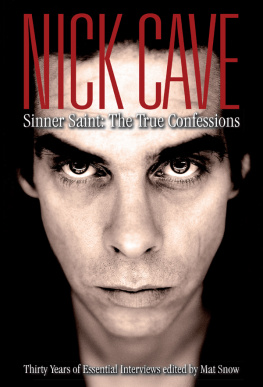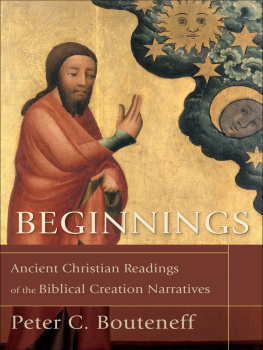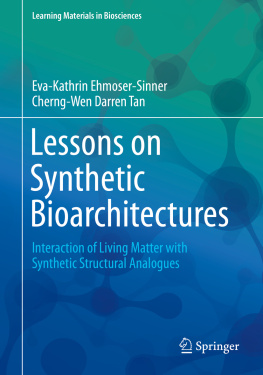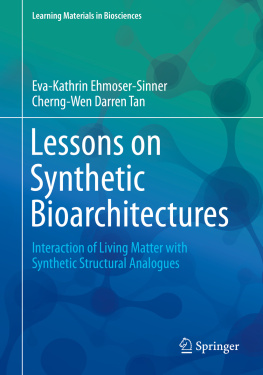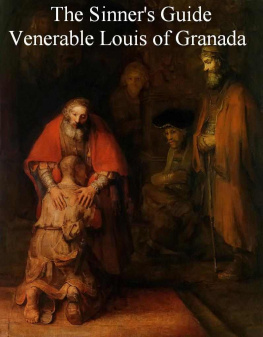How to Be a Sinner
Finding Yourself in the Language of Repentance
Peter Bouteneff
ST VLADIMIRS SEMINARY PRESS
Yonkers, New York
Copyright 2018
St Vladimirs Seminary Press
575 Scarsdale Road, Yonkers, NY 10707
1-800-204-2665
www.svspress.com
ISBN 978-0-88141-624-4
All Rights Reserved
For Brother John
Preface
C ommon to most religious life is the understanding that we human beings are flawed, and that we are liable to think and do wrong. Classical Christian tradition pulls no punches when it comes to expressing what that means for me and for my plight as a human being. In our regular set prayers, we call ourselves sinners, wretched, pitiful, and worthy of condemnation. This language can sound odd or extreme to many sensibilities, yet there it is, front and center. If we accept that we are sinners, how do we understand that in a proper way? How does it help us heal and find redemption?
I have been thinking on these themes for several years. I began putting them to paper for a Lenten retreat I gave in 2015 at St Vladimirs Seminary, where I have taught for nearly twenty years. I am grateful to my colleagues, students, and former teachers there, for their support and for all they continue to teach me. Much of this book was written during several visits to New Skete, where I gained immeasurably from the monks and nuns hospitality and my conversations with them. I am grateful to my wife, Patricia, who to an ever-increasing degree has been my inspiring conversation partner, challenging sounding board, and generally humbling influence. She is also the best editor Ive ever had. If this book is of any use to you, its thanks to the people and communities Ive mentioned, together with many others whom I love and esteem. Its faults are my own. Oh, and about those faults ...
Introduction
E verybody sins. We all fall short of the glory of genuine human lifesometimes in small ways, sometimes in larger ways, sometimes by thinking, saying, and doing, truly terrible things. The Bible and every church service remind us of this constantly. I may ask myself, Am I really that horrible? I may think, This is so negative and judgmental. Or perhaps, Wait, am I beginning to like this language in a strange way? Or else, Ive had too many people in my life tell me Im worthless. I dont need a book and a church to add to that hateful chorus.
But if we are going to be part of the Church, we must face up to the sin within us. In the New Testament, we hear St Paul saying, None is righteous, no, not one (Rom 3:10). Later, we read, If we say we are sinless we deceive ourselves (1 Jn 1:8). We are meant to acknowledge that everyone transgresses. And that means that I sin. That I am a sinner. More starkly, as St Paul says in another epistle, I am the foremost of sinners (1 Tim 1:15).
The idea goes back to the Old Testament. In prayer, we echo the psalmist,
For I know my transgressions,
and my sin is ever before me.
Against you, you alone, have I sinned,
and done what is evil in your sight,
so that you are justified in your sentence
and blameless when you pass judgment.
Indeed, I was born guilty,
a sinner when my mother conceived me.
(Ps 51:35)
Even though the language of sin can make us uncomfortable, it also acknowledges the world as we know it. Its not a stretch for most of us to see that the world is broken and that the root of the problem lies in our human inclination toward the wrong. Reinhold Niebuhr famously remarked, Original sin is the only empirically verifiable doctrine of the Christian faith. People may not accept Christianity or the existence of a personal God. But they generally have little problem believing that our existential situation is dire.
Where do we situate ourselves in that picture? In the 1930s, someone asked the English writer and lay theologian G. K. Chesterton what was wrong with the world. He answered, I am. The idea of each of us taking responsibility, of locating societal sin with me, my own self, hasnt exactly presented itself as attractive in public discourse, however. Yet public opinion on these matters is beginning to shift. An increasing number of social commentators and psychologists, secular and religious, are drawing attention to the need for a healthy understanding of sin.
Self-identifying as a sinner is tricky to get right. I can have healthy reasons for avoiding that identity, as it has been known to perpetuate harmful behavior or abusive relationships. Focusing on myself as a sinner risks becoming maudlin or masochistic. Yet the sinner identity is usefulif only to provoke us to ask ourselves some challenging questions. Am I reluctant to take a deep, critical look at my thoughts and actions? Am I afraid of humility, because it might set me back in my career ambitions? Am I just a pawn in a dominant culture of self-gratification? These questions are neither simple nor straightforward. But grappling with them can play a pivotal role in my flourishing, my inner peace, my relationship with God and the world.
The thesis of this short book is that there are realistic, useful, and healthy ways to understand ourselves within the dynamic of sinjust as there are also destructive and unhelpful ways. The goal is to help us find and walk a well-directed path through critical self-reflection, in freedom, joy, divine grace, and mercy.
As a start, let me introduce you to some people, who might sound familiar. The first two have trouble self-identifying as sinners. The third finds it too easy.
John considers himself a basically decent person. He has never seriously injured anyone. He is faithful to his wife. He goes to work, does his job, and looks after his family. He is more-or-less honest in his financial dealings. He doesnt see the point of confessing his sins. Sure, he tells the odd lie and sometimes stares at erotic images on the internet. But he believes in God, and regards himself as a normal, reasonable person. He sometimes quotes Homer Simpson, saying Im not a bad guy! I work hard, and I love my kids. So why should I spend half my Sunday hearing about how Im going to hell?
Joanne despises herself and her life. Her parents hadnt wanted children and regularly reminded her that, if anything, they would have preferred a son. They rarely called her by her name. Her father sometimes beat her, though in other moods he was uncomfortably affectionate. Nothing that Joanne did seemed to be good enough. Her efforts always fell short of what her parents wanted. In fact, she couldnt figure out what their expectations were, given that they fluctuated between the unattainably high and the pathetically low. She sometimes cuts herself. The idea of calling herself a sinner makes her feel sick. Although she knows the term well, it represents everything shes trying to move beyond. Her therapist has advised her to have as little to do with her family and her church as possible.
Paisios joined the Church a year and a half ago. His name used to be Jim, but hes asked his friends and family to refer to him by his new Christian name. He signs his emails, even if they contain nothing more than the days shopping list, + The Wretch, Paisios. He is participating in an unacknowledged contest with others as to who is the worst sinner. He dresses in black, reads ascetical literature, and has grown a flourishing beard. He goes to confession, though not to his parish priest but to a monk 250 miles away.
All of these examples represent instances of the sinner identity that need some adjustment, so as not to lead either to self-destruction or hubris. In addition, the Churchs reminders of our sinfulness are at loggerheads with our current society, which encourages self-empowerment, accepting ourselves, and abolishing negative thoughts or language about ourselves. This call to self-affirmation begins early. Virtually every film aimed at children seems to hammer at the theme, Be true to yourself; love yourself exactly as you are. Every child in a sports or academic competition receives a trophy for showing up. For people who grow up in such a culture, the Churchs fixation on personal wretchedness may promise to stir up a cocktail of self-hatred, masochism, abandoning success and fulfillment, or humbly bragging that you are the greatest of offenders. As if it were a contest.




![Dzhon Makdonald - The Sinner of the Saints [story]](/uploads/posts/book/924785/thumbs/dzhon-makdonald-the-sinner-of-the-saints-story.jpg)
![Sheldon Lord - Savage Lover [= Sinner Man]](/uploads/posts/book/875413/thumbs/sheldon-lord-savage-lover-sinner-man.jpg)
